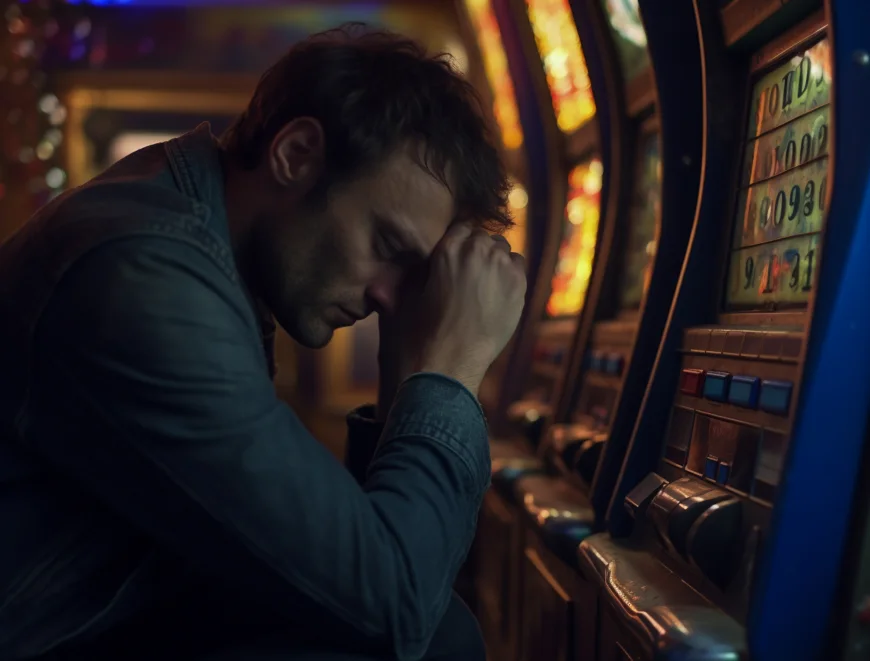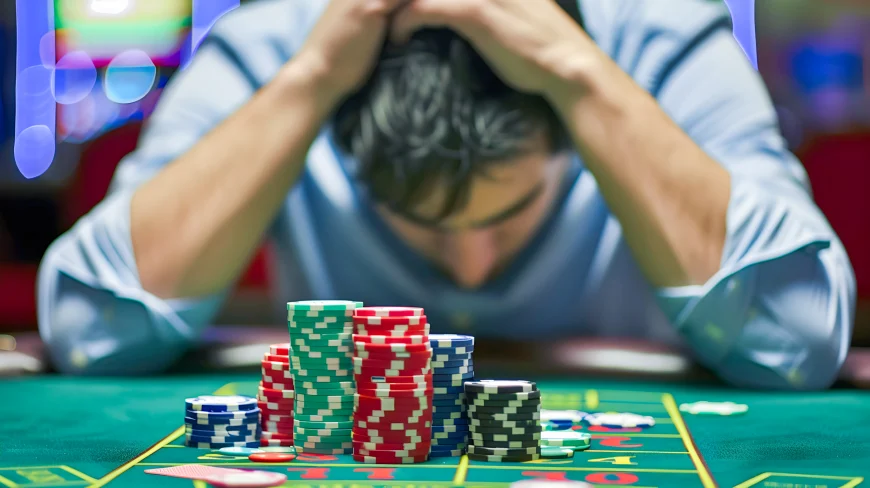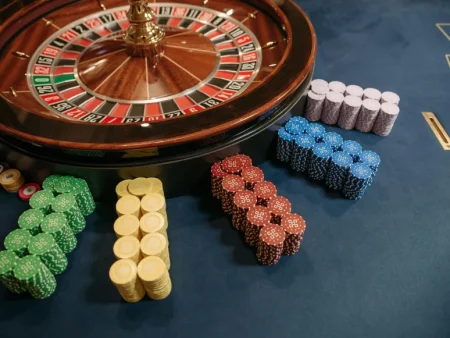Gambling can bring moments of excitement, but it can also create painful money problems. When losses pile up, many people feel stuck. They wonder if they will ever get back on track. The truth is that recovery takes time, but it is possible. It’s about more than money; it’s about mindset, choices, and support. And yes, taxes also play a role, because gambling income gets treated as taxable income under IRS rules. With the right steps, even a taxpayer who feels hopeless can rebuild. In 2025, tax planning around gambling will matter more than ever because of changing tax policies.
What is Gambling Loss?
A gambling loss is the money you lose from a wager or bet in a casino or through another type of gambling activity. It includes losses from slot machines, poker, sports betting, and more. Many people don’t realize that gambling winnings and losses must be reported on Form 1040. For some, these numbers affect taxable income and even their tax liability. If the losses exceed their winnings, they still may owe taxes because of phantom income. That’s why tax planning is part of financial recovery. This is also where income tax rules often confuse people, because losses are treated differently from other expenses.

The Effects of Gambling Losses
Losses from gambling do more than shrink a wallet. They often spread into other areas of life, creating problems that feel overwhelming. Some people stop paying bills. Others hide the truth from their families. It’s easy to see how one bad habit can ripple outward. And when the new law about deductions came out under the Tax Cuts and Jobs Act, it reminded everyone that gambling isn’t only risky for money. It also has tax policies attached to it. In fact, some call it a new tax that feels hidden. Add in the new tax law coming soon, and you can see why gamblers need awareness.
Financial Effects
Financial effects of gambling losses are usually the first signs people notice. A taxpayer might fall behind on rent, property tax, or car payments. Money that once covered basics goes toward the amount of gambling instead. When taxes are due, things get even harder. If you can’t deduct gambling losses, your tax bill grows. The federal tax law requires you to keep detailed records showing the amount of gambling winnings and losses. Without those records, you can’t itemize your tax deductions or prove you broke even. Some experts say the OBBBA provision might even impact how gambling-related deductions work.
Mental and Emotional Effects
The mental side of gambling losses can be heavy. People feel guilt, shame, or even hopelessness. Sometimes it feels like phantom income; you see numbers on paper, but in real life, you are empty. Stress rises, sleep falls, and small problems seem bigger. It’s easy to ask, “Why me?” but that thought keeps you stuck. A healthier step is admitting what happened and starting to plan for change. Even small wins in self-control can begin to rebuild confidence. That mindset shift is as important as any deduction.
Social and Relationship Effects
Gambling often creates tension in families. Friends and loved ones may feel betrayed if money is missing or if lies were told. Relationships can break down when bills aren’t paid or when trust is lost. A spouse may discover a tax return showing gambling income they never knew about. Sometimes, people hide their gambling by borrowing or stealing. The result? Social isolation. Recovery means not just fixing money, but also mending relationships. That’s a harder road, but it is worth it. And when new rules like the one big beautiful bill act are signed into law, families will also feel the changes in tax reporting.
Behavioral Effects
Behavioral changes happen too. Many who gamble start chasing losses, believing they will win back what they lost. They spend more time gambling, take bigger risks, and even skip work or school. It becomes a cycle. Professional gamblers know the risks but may still struggle. The behavior can spill over into other areas, like drinking more or lying often. Over time, these habits damage more than a wallet; they hurt character. Recognizing behavior patterns is the first step to real change.
7 Ways to Stop Chasing Losses
Chasing losses never ends well. It leads to more debt, more stress, and more regret. The good news is that you can break the cycle. Each step here gives you tools to slow down and regain control. Think of them like barriers that protect you. They may not feel easy at first, but with time, they create space to heal. Even if you feel the new rule or new limit around taxes matters, what really counts is stopping the behavior. Otherwise, you face harder choices beginning in 2026.
1. Address the Root Cause of Your Gambling
Ask yourself why you gamble. Is it boredom, stress, or a search for excitement? Getting honest about the reason is key. If you only treat the surface, the problem stays. Some people discover they gamble because they feel empty or sad. Others realize they use gambling to escape. Once you know the root cause, you can seek healthier solutions. Without that step, recovery feels like guesswork—and you deserve more than that.
2. Set a Budget
Money management is part of recovery. Start by writing down your income and expenses. Create a plan that shows what is deductible and what isn’t. A budget is not about punishment, but it’s also about clarity. When you see numbers on paper, you make smarter choices. Some even use the standard deduction on their taxes as motivation: if they can keep their finances neat for the tax year, they can keep them neat every month. Even one big beautiful bill can feel manageable with a solid plan.
3. Accept Your Loss
It sounds simple, but it isn’t. Acceptance means you stop chasing. You admit the money is gone. You don’t expect a big win to fix everything. This step takes humility. It means telling yourself, “I lost, and that’s okay. I will learn.” Without this mindset, you keep falling into the trap. Remember, even if you could deduct 100 percent of your gambling losses on taxes, the pain of chasing would still remain. Acceptance is freedom.
4. Seek Support
Support matters. Talking to family, friends, or a counselor can make recovery easier. Some join groups where others share similar struggles. A tax professional can help with questions about gambling losses tax and how to report them. If you try to do it all alone, it’s harder to succeed. With support, you don’t just share the burden; you find new hope. People around you can remind you that you are more than your losses.
5. Take Breaks and Step Away
Stepping away from gambling for a while is powerful. It clears your mind and helps you see things in a new way. Some people block gambling websites or avoid casinos. Others pick up new hobbies like exercise or reading. Taking breaks doesn’t just stop money loss but also rebuilds control. Think of it as pressing pause. The pause lets you breathe, plan, and decide what really matters. That space makes recovery possible.
6. Use Barriers
Barriers can be practical tools. Some banks let you block transactions to gambling sites. Others set spending limits. Friends or family can hold your cards for a while. You can also self-exclude from casinos or betting apps. Each barrier makes it harder to gamble when temptation strikes. While no barrier is perfect, they buy you time. And time helps your brain reset. Even a simple barrier can mean the difference between a slip and success.
7. Reframe Your Thinking
Your thoughts shape your choices. If you tell yourself, “I can win it back,” you keep gambling. Instead, reframe it. Say, “I lost, and that’s my signal to stop.” This shift changes the story in your head. Some even use reminders: write down a note like “I owe taxes on money I lost” and keep it nearby. It may feel strange, but reframing works. When your thinking changes, your actions follow. That’s the power of perspective.

6 Warning Signs of a Gambling Problem
Not everyone knows when gambling has crossed the line. Warning signs often creep up slowly. By the time people notice, debt is high, and relationships are strained. Paying attention to these signs can save you from bigger damage. Think of them as alerts. If you see yourself in these examples, it’s time to act. Sometimes, prevention is easier than repair.
1. Increasing Time and Money Spent on Gambling Activity
Spending more time and money than planned is a clear warning sign. Maybe you used to gamble once a week, but now it’s daily. The type of gambling doesn’t matter—slots, sports, or poker. If the habit is growing, pay attention. The more you spend, the higher your tax liability may become too, since gambling income is treated as taxable income from gambling. Growth in this area is dangerous.
2. Chasing Losses
Chasing losses means trying to win back what you lost. It feels logical, but it’s a trap. You tell yourself, “Just one more win.” But it never ends. People who chase often end up owing more. They sometimes realize they can’t deduct enough to cover what they spent. It’s a cycle of stress. If you notice yourself chasing, step back. The longer it goes on, the harder it is to stop.
3. Borrowing or Stealing Money
When money runs out, some people borrow or steal. They may borrow from friends, take payday loans, or even steal from work. This creates bigger problems. Relationships suffer, and legal trouble can appear. It’s one thing to lose your own money. It’s another to use someone else’s. If you notice this habit, it’s a red flag. Gambling should never push you into dishonesty. That path only makes recovery harder.
4. Feeling Restless or Irritable
Restlessness is another sign. If you feel upset when you can’t gamble, something’s wrong. Some even get angry or snap at loved ones. Irritation grows when the chance to gamble is blocked. This shows gambling has become more than a game; to some, it’s a need. That needs points to addiction. A healthy hobby should not control your mood. If it does, it’s time to seek help.
5. Failed Attempts to Quit
Trying and failing to quit is a big signal. You promise yourself you’ll stop, but the urge pulls you back. Each failed attempt makes you feel weaker. That loss of control is part of the cycle. If you notice repeated failures, it’s not just a bad habit; it’s a deeper problem. Admitting this doesn’t mean defeat. It means you’re ready to find real support.
6. Risking or Losing Important Relationships
Losing trust in loved ones is painful. When gambling comes first, relationships suffer. People miss family events, lie about money, or argue about debt. Some marriages even end. If gambling is hurting your closest bonds, that’s a clear warning. Relationships are more valuable than any win. Once you risk them, the damage takes years to repair. Don’t wait until it’s too late to act.
What Should You Do When Gambling Loss Sets In?
When a gambling loss hits, the pain feels real. The key is not to stay stuck in that place. Action is possible. The steps below give you small but powerful ways to move forward. None is easy, but each brings relief. If you’re willing to try, recovery can begin today. The sooner you start, the faster you heal.
Acknowledge What You Are Feeling
Feelings matter. If you ignore them, they grow stronger. Sit with them. Say out loud, “I feel angry, sad, or scared.” Acknowledging feelings gives them less power. It doesn’t mean you like the loss; it means you accept reality. This step lays the groundwork for healing. Denial delays progress, but honesty speeds it up. Naming feelings is the first form of strength.
Open Up to Someone
Sharing makes the burden lighter. Talk to a trusted friend, family member, or counselor. Explain what happened and how you feel. They may not fix the problem, but their support will matter. Even saying it out loud can lift shame. Some also share with groups online or in person. Opening up is not a weakness but a courageous act. It shows you’re ready to change.
Find Things That Bring You Joy
Replace gambling with joy. Pick activities that give peace or excitement without financial risk. Exercise, cooking, reading, or even walking outside can help. Small joys add up. They shift your focus away from loss. When you fill your life with positive things, gambling feels less needed. Think of joy as fuel to power your recovery. Without it, the journey feels harder.
Get Treatment for the Gambling Problem
Sometimes professional help is needed. Therapists or support groups give tools you can’t find alone. They teach coping skills and provide accountability. Treatment is not about shame but about learning. A tax professional may also guide you on how to handle the deduction of gambling losses or report gambling losses on your tax return. Combined support can make recovery both financial and personal.
5 Tips for Financial Recovery From Gambling Losses
Money recovery takes planning and patience. It doesn’t happen overnight. Each of these tips gives you a way to rebuild step by step. Think of it like stacking bricks—one at a time until the wall stands strong again. Use these tips to create a future that feels stable, not shaky.
1. Set Realistic Goals
Don’t aim for perfection overnight. Start small. Pay off one bill, save a little money, or track expenses for a week. Goals should feel possible. If you set goals too high, failure comes quickly. When you succeed at small goals, confidence grows. Each small win builds momentum. Before long, you’ll see bigger change. Realistic goals are the foundation of recovery.
2. Build a Realistic Budget
A budget shows where your money goes. It also highlights what is deductible and what isn’t. When you budget, you’re in control. Start with basics: rent, food, and bills. Then add savings. Make space for small joys, too. A strict budget without fun often fails. A realistic one lasts. Budgets help with taxes as well. If you itemize deductions, your records will already be neat and ready for the next tax year.
3. Get a Clear Picture of the Damage
You can’t fix what you don’t see. Write down all debts and balances. Look at how much gambling income you reported and compare it to losses. Knowing the full damage helps you plan. Sometimes it’s worse than you thought, but clarity is better than guessing. Facing the truth is tough, but it’s the only way forward. Hiding from numbers only delays recovery.
4. Seek Out Financial Counseling
Financial counseling is a game-changer. Experts help you organize debts, plan repayment, and even negotiate with creditors. They also know tax rules. For example, they can explain how deduction limitation works or when a new deduction applies. Their guidance makes the journey less lonely. Counseling also builds accountability. You don’t just promise yourself to do better; you show progress to someone else.
5. Lean on Your Support System
Support is not just emotional, but it can be financial, too. Family or friends may help with small loans or shared living costs. Community groups can connect you to resources. Even talking through stress saves money by reducing impulse spending. A strong support system acts like a safety net. When you fall, they help you get back up. That net makes the climb back up much safer.
Hitting Rock Bottom Through Gambling Losses
Rock bottom feels dark. It’s when losses are too big to hide, and pain is too strong to ignore. Some face bankruptcy, broken families, or even legal trouble. Others realize their tax liability has grown because they can’t itemize or claim a deduction for gambling losses. At that point, the weight feels unbearable. But here’s the truth: rock bottom is not the end. It’s the place where change begins. Many who rise up later say rock bottom saved them.
Building a Gambling-Free Future
A gambling-free future is possible. It starts with small choices each day. Avoid the casino, block the apps, and focus on joy outside of betting. Financial habits improve over time. You begin to see a tax return that doesn’t list gambling income. You see savings grow. You see relationships heal. With effort, life looks brighter. It’s not easy, but it’s worth it. Your future can be free, steady, and full of real wins.
FAQs
Is professional help necessary for financial recovery?
Professional help is not always required, but it often makes recovery easier. Financial counselors and therapists provide tools you may not find alone. They can explain useful loss limitations to help you with taxes and create budgets that work in real life. Without guidance, it’s easy to repeat mistakes. With it, recovery can move faster and feel less overwhelming. Everyone’s journey is different, but help rarely hurts.
How long does it take to recover financially from gambling losses?
Recovery time varies. Some people regain stability in months, while others need years. It depends on debt size, income, and personal discipline. If tax issues are involved, recovery may stretch longer. A person who has to deal with a tax bill alongside gambling debt will face more challenges. The key is consistency. Small progress made over time builds lasting change. Patience and persistence matter most.
What records should I keep for gambling winnings and losses?
The law requires you to keep detailed records of your gambling. This means keeping tickets, receipts, and bank statements that show both winnings and losses. These records help when reporting gambling losses on your tax return and can protect you if audited. Without them, you can’t itemize your deductions or claim that you offset gambling winnings. Records are your proof. Without proof, the numbers don’t count.
Can I deduct gambling losses on my pay taxes?
Yes, but with limits. The deduction of gambling losses only applies if you itemize deductions on your tax return. You can deduct losses up to the amount of gambling winnings, but you can’t deduct more. This means if your losses exceed their winnings, you still pay taxes on the net winnings. Deduction rules change often with tax policies, so checking with a tax professional is smart.
Where do I claim gambling loss deductions?
Gambling losses are reported on Schedule A when you itemize your deductions. They must match your reported gambling income. The deduction is limited to losses up to the amount of winnings. For many, the standard deduction is simpler, but those with large winnings may choose to itemize. Talking with a tax professional ensures you do it right. Mistakes could cost you more money in the long run.
Are gambling winnings taxable even if I lost more than I won?
Yes. Gambling winnings are always treated as taxable income, no matter the losses. Even if you broke even or lost more, you must report the income realized from betting earnings. This is why some taxpayers feel stuck with phantom income. While you can deduct gambling losses if you itemize, the deduction is limited. If you can’t itemize, you may owe taxes even when you didn’t really profit.















